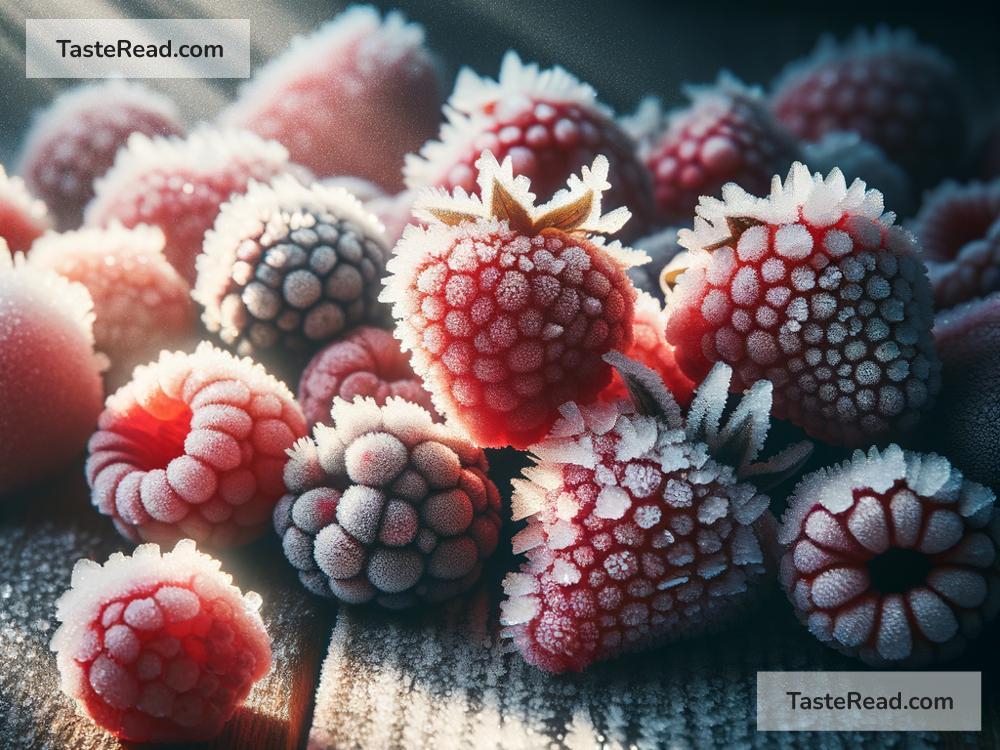How Freezing Concentrates the Sweetness of Fruits
Have you ever eaten a frozen grape or berry and noticed how it tasted sweeter than usual? Freezing fruits doesn’t just make them cooler to eat; it also intensifies their sweetness. The science behind this process is fascinating yet simple, and understanding it helps us appreciate why frozen fruits can make a great snack or ingredient for desserts. In this article, we’ll explore how freezing affects fruits and why their sweetness often feels sharper after they’ve been frozen.
The Basics of Fruit Sweetness
Fruits are naturally sweet because they contain sugars like fructose and glucose. These sugars are what give fruits their pleasant taste. The amount of sugar in a fruit depends on its type, ripeness, and growing conditions. For example, bananas contain more sugar than lemons, and ripe peaches are sweeter than unripe ones. The sweetness you experience when eating fresh fruit is the result of these sugars blending with other components, like water and acids.
What Happens When You Freeze Fruits?
When fruits are frozen, the temperature drops significantly, causing water inside the fruit to solidify and form ice crystals. This freezing process slows down or completely stops the fruit’s natural breakdown and ripening processes. While this might seem simple, freezing sets off changes within the fruit’s texture, flavor, and sweetness.
Here’s the key: Freezing doesn’t actually add more sugar to the fruit. Instead, it changes how sweetness is perceived. Let’s explore how.
The Concentration Effect
Fruits are made up of water, sugars, and other compounds. When they are frozen, the water inside them turns into ice. Ice doesn’t taste sweet because it’s just frozen water with no sugar in it. When frozen fruits thaw slightly, the process releases some water in the form of melted ice. This reduces the amount of water content in comparison to the sugar content. As a result, the sugars in the fruit are now more concentrated, making the fruit taste sweeter.
Think about orange juice concentrate as an example. Manufacturers remove water from the juice to make it more potent. Similarly, freezing fruit removes or reduces water, leaving behind a denser sweetness because there’s now less water diluting it. Eating frozen fruit may feel like biting into a treat that’s packed with flavor.
Changes in Texture and Flavor
Freezing doesn’t just concentrate sweetness—it also changes the texture of fruits. For example, freezing causes many fruits to become softer when they thaw. This happens because the ice crystals that form during freezing expand, breaking down the cell walls inside the fruit. While this softer texture may not always be ideal, it does make fruits easier to blend into smoothies or desserts like sorbet and pie fillings.
Flavor also changes during freezing. Some fruits, like berries, develop a richer, mellower flavor after being frozen. Others, like bananas, may taste slightly less complex but noticeably sweeter. This altered flavor profile is another reason why frozen fruits are a versatile ingredient in many recipes.
Why Frozen Fruits Make a Great Snack
Frozen fruits are convenient, sweet, and healthy. Because freezing locks in nutrients, fruits like berries, peaches, and grapes retain their vitamins and minerals even after spending time in the freezer. There’s minimal preparation required—simply take them out of the freezer and enjoy as is, or let them thaw slightly for snacking.
Moreover, frozen fruits are refreshingly sweet but not overly sugary. The concentrated sweetness feels natural and balanced, unlike sugary candies or snacks. This makes frozen fruits a healthier option when you’re craving something sweet.
How to Maximize Frozen Fruit Sweetness
Want to enhance the natural sweetness even more? Here are a few tips:
-
Freeze Ripe Fruits: The ripeness of a fruit determines its sugar content. For maximum sweetness, choose fruits that are at their peak ripeness before freezing.
-
Cut or Slice Before Freezing: Smaller pieces freeze faster and thaw more evenly. Sliced fruits also allow you to enjoy their concentrated sweetness quicker.
-
Use Them in Recipes: Frozen fruits are fantastic for making smoothies, desserts, or even infused water. The sweetness will shine through in your dishes.
-
Pair Them with Other Ingredients: Frozen fruits taste great with yogurt, oatmeal, or a drizzle of honey.
The Takeaway: Sweetness Locked by Nature
Freezing is a simple way to make fruits taste sweeter without adding sugar. By reducing water content and concentrating natural sugars, frozen fruits pack a flavorful punch that’s refreshingly healthy. Whether you’re snacking on frozen strawberries or adding frozen mango chunks to your smoothie, you’ll enjoy the enhanced sweetness and convenience they offer.
Next time you reach for fruit, try freezing it first—you might find yourself loving the concentrated flavor. And if science isn’t your thing, simply enjoy the sweet magic nature presents in every icy bite!


